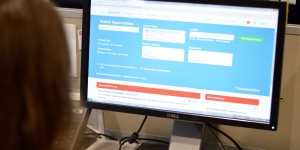Sometimes it can seem impossible to find a job for you that is related to your degree. Some courses don’t have obvious lines of work that you’ll be eligible to apply for as soon as you graduate. Some courses do, but you might want to explore other options.
LSE Careers has a range of resources that can give you ideas of what jobs you could go into based on your course, and help you both find a job you’d love and achieve the skills to get it.
1. Graduate destinations
One of the first and easiest things you can do when figuring out your potential career is to see what past students are doing now.
Go to our Graduate Destinations website to find out the roles that LSE students from the past three years have gone into six months after their graduation. You can even search by department and degree programme, so you can see exactly what careers are most relevant to what you’re studying now.
2. CareerHub keyword search
Our Opportunities search bar on CareerHub can help you find exactly what you’re interested in. You don’t just need to search job-specific terms to find opportunities: the keyword search means you can look for just about anything that is relevant to you.
Try searching your department or degree subject (eg. anthropology, accounting) and you’ll find roles that you might not have even considered. This extends to anything that you want to be involved with – you can also search various other terms related to your skills and interests (eg. coding) that can help you find a huge selection of possible choices.
3. Don’t worry if your job isn’t related to your degree (yet)
Your degree course doesn’t need to dictate what you do for the rest of your life. For example, if you’re studying accounting, you don’t have to work as an accountant forever if you find that the job isn’t for you. Some of our accounting students have gone on to become a whole range of different things, from property analysts to graphic designers, and this is similar for all our courses.
Likewise, don’t worry if you want to do something related to your course but haven’t got there yet. Any work experience can cultivate a range of transferable skills, so any work that you are doing now can help you move into a different sector later. Have a look at our achieving your career webpage, and book an appointment with one of our consultants if you want to discuss how to change careers.
4. Employment sectors
Sometimes certain sectors seem impossible to break into, and aren’t always clear on what sort of roles you can start off with. Our Employment Sectors pages can help you clarify these details. Each sector is split up into sections of the possible areas and roles and how to break into them. We also have regular blog posts with news for each sector on these pages, so check back to see our updates.
5. Meet alumni
Where better to get advice than LSE alumni who are currently working in sectors and organisations you’re interested in? The LSE Alumni department run a mentoring network, so you can find LSE alum in areas related to your career interests and discuss their paths with them.
6. Course-specific events
We offer a range of events specific to LSE courses and departments to help you find exactly what you can use your degree for. These are run by our careers consultants, and will offer you ideas as well as answering any questions you may have.
These run throughout the year so look out on CareerHub. You can book into these events a week in advance.
7. Check out our graduate profiles
Graduate profiles are a great way to get a more in-depth look at the career destinations of our recent graduates. We also run a blog series called graduate profile of the week. This will give you insight into the different career paths our alumni have taken, and how they’ve progressed in their fields.
8. Specialise further
One way to get into a subject-specific field is by furthering your education. The Postgraduate study section on our website gives you some information and advice about applying for master’s and PhD courses. This includes where to find courses that are right for you, as well as funding options and advice for personal statements. You can also book an appointment with any of our careers consultants to have a talk about these options and your applications.
9. Understand your own skills
Remember that your future career is based on what you want and the skills that you have. Our career planning and job hunting web pages will be useful for you to find the right career for you, but remember that your career is your choice.
You need to understand and develop your own skills to get into any sector, but it’s OK if you don’t know where to start. Book an appointment with one of our careers consultants and take the first step towards a job that works for you.








Despite your degree all it takes is some training and adaptability and you are good.